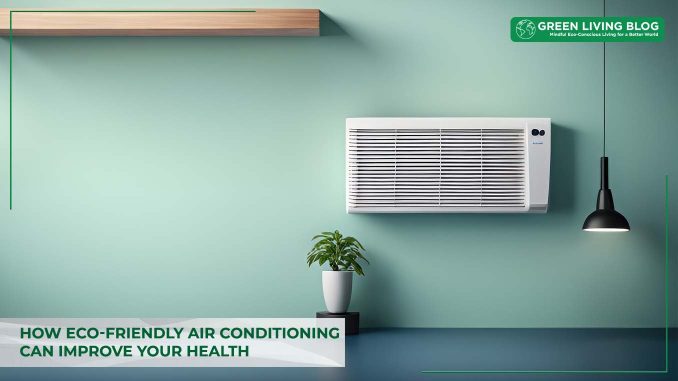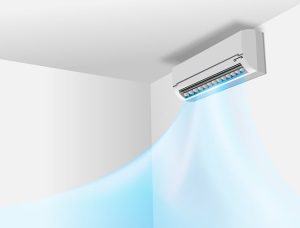
Eco-friendly living and sustainability are becoming increasingly important as individuals and communities seek to reduce their environmental impact and promote healthier lifestyles.
People can contribute to a cleaner, healthier planet by adopting practices that minimize waste and conserve resources. One area where eco-friendly innovations make a significant difference is air conditioning systems.
Traditional units can be energy-intensive and harmful to the environment. Eco-friendly alternatives use advanced technologies to operate more efficiently and reduce greenhouse gas emissions.
These systems help protect the environment and improve indoor air quality, making them a smart choice for those committed to sustainability.
Understanding Eco-Friendly Air Conditioning

Eco-friendly air conditioning systems minimize environmental impact using advanced technologies, enhancing energy efficiency and reducing greenhouse gas emissions. These systems utilize renewable energy sources — such as solar power — and natural refrigerants with a lower global warming potential than traditional ones.
These systems can significantly reduce energy use since electricity and heat production are the most significant contributors to harmful emissions. Traditional systems, in contrast, often use large amounts of electricity and rely on refrigerants that can harm the ozone layer. Adopting eco-friendly alternatives allows consumers to enjoy effective cooling while contributing to a reduction in their carbon footprint.
Health Benefits of Eco-Friendly Air Conditioning

Switching to eco-friendly air conditioning systems benefits the environment and significantly improves personal health. These systems offer various health advantages by enhancing indoor air quality and creating more comfortable living spaces.
1. Improved Indoor Air Quality
Eco-friendly air conditioners use advanced filtration technologies to filter and purify indoor air. These systems can reduce allergens, pollutants and toxins to create a healthier indoor environment.
They continuously cycle and clean the air, helping mitigate health risks associated with outdoor smoke pollution, such as those from wildfires or urban smog. This purification process ensures indoor air remains free from harmful particles, promoting respiratory health and overall well-being.
2. Enhanced Respiratory Health
Eco-friendly air conditioning systems profoundly impact conditions like asthma and allergies. These systems remove allergens and pollutants from the air to create a cleaner indoor environment that reduces the frequency and severity of asthma attacks and allergic reactions.
The improved air quality from eco-friendly systems can lead to significant health improvements, including better respiratory function and fewer symptoms related to these conditions. As a result, individuals with asthma and allergies experience a more comfortable and healthier living space, enhancing their quality of life.
3. Better Sleep Quality
Eco-friendly systems help maintain stable and optimal indoor temperatures, which is crucial for restful sleep. Experts suggest the ideal temperature for sleeping is around 65 F or 18.3 C, which is a setting air conditioners can achieve and sustain.
Additionally, these systems operate quietly to reduce noise pollution and create a peaceful environment conducive to better sleep. The ideal temperature control and low noise levels ensure a more comfortable and uninterrupted night’s rest, contributing to well-being and health.
Choosing the Right Eco-Friendly Air Conditioning System

Selecting the right eco-friendly air conditioner maximizes environmental and health benefits. Here are tips to ensure optimal performance and sustainability.
Factors to Consider
When choosing an air conditioner, it’s crucial to look at efficiency ratings, certifications, and eco-friendly features. The Seasonal Energy Efficiency Ratio (SEER) is an essential metric. For instance, a unit with a SEER rating of 13 is approximately 30% more efficient than an older unit with a rating of 10.
Additionally, certifications like Energy Star can indicate higher efficiency and lower ecological impact. Eco-friendly features such as natural refrigerants and advanced filtration systems enhance the unit’s sustainability and health benefits.
Tips for Maintenance
Regularly servicing eco-friendly air conditioners maintains their health benefits and ensures optimal performance. The best time to clean these appliances is before each cooling season begins, allowing the system to operate efficiently when needed.
DIY maintenance tips include regularly changing or cleaning filters, checking for blockages in the air ducts and ensuring the outdoor unit is free from debris. These simple steps help maintain air quality and system efficiency, prolonging the machine’s life and maximizing its health benefits.
Adopting Eco-Friendly Practices for Better Health
Adopting eco-friendly practices can significantly improve personal health and environmental sustainability. Exploring and investing in ecological air conditioning systems allows individuals to enjoy cleaner air and better health and contribute to a greener planet.
![]()
Author Profile

- Eco Warrior by day, Eco Blogger by night trying to get the eco balance right.
Latest entries
 Green GuidesNovember 3, 2025The Beginner’s Guide to Making Your Own Nontoxic Candles at Home
Green GuidesNovember 3, 2025The Beginner’s Guide to Making Your Own Nontoxic Candles at Home Green Home GuidesOctober 14, 2025What are Eco-Friendly Tissue Options for Modern UK Homes?
Green Home GuidesOctober 14, 2025What are Eco-Friendly Tissue Options for Modern UK Homes? Best practicesSeptember 17, 20253 Ways Young Families Can Commit to Sustainable Living
Best practicesSeptember 17, 20253 Ways Young Families Can Commit to Sustainable Living EnvironmentSeptember 9, 2025Eco-friendly Gardening on a Budget: 6 Sustainable Choices that make a Difference
EnvironmentSeptember 9, 2025Eco-friendly Gardening on a Budget: 6 Sustainable Choices that make a Difference





Leave a Reply
You must be logged in to post a comment.